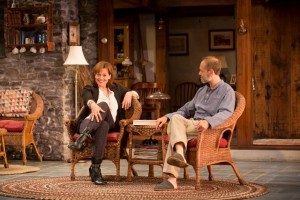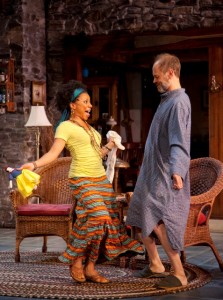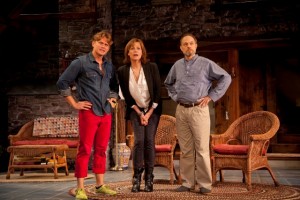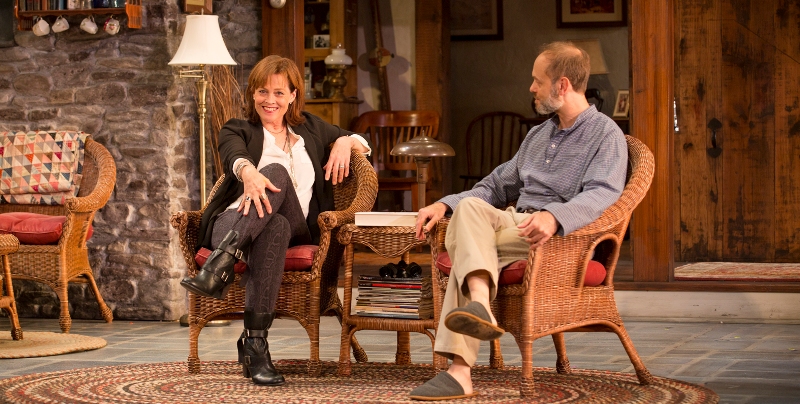
Sigourney Weaver and David Hyde Pierce star in McCarter Theatre’s production of Christopher Durang’s VANYA AND SONIA AND MASHA AND SPIKE. (Photo credit: T. Charles Erickson)
VANYA AND SONIA AND MASHA AND SPIKE (hereafter “VSMS” because, well… come on) opens in the quiescent sunroom of a rural Pennsylvania farmhouse as the first two of its title characters gaze out over a pond. During a spat about the morning coffee ritual, Sonia (Kristine Nielsen) hurls two full coffee mugs crashing into the back wall, followed by Vanya’s (David Hyde Pierce) deadpan, “Some people claim antidepressants help them.” Sonia: “If everyone took antidepressants, Chekhov would have had nothing to write about.”
All that’s missing is a rim shot and laugh track.
Christopher Durang’s new star-studded play, running now at Princeton’s McCarter Theater and later at Lincoln Center, is rife with this sort of hammy-intellectual humor, and while the actors are never guilty of trying to impose gravity, the play leaves us wondering what lies behind its thin façade of sitcom humor. It is a façade best left undisturbed, lest its hollowness collapse upon itself. Packed as it is with wall-to-wall punch lines, zingers, and sight gags, plenty of the play’s humor succeeds in arousing a belly laugh or two, but the piling of joke upon joke seems mostly to conceal a dearth of complexity, heart, and human connection.
Vanya and Sonia are siblings—named along with their sister Masha after Chekhovian characters by their professor parents with a passion for community theater—living a life of quiet stasis in the family farmhouse (gorgeously rendered by set designer David Korins). Masha (Sigourney Weaver), who fled to Hollywood years ago where she has made a successful career acting in a series of “nymphomaniac serial killer” films, disturbs their pastoral seclusion by returning home with her new much younger boy toy, Spike (a buff and often shirtless Billy Magnussen). It is unclear exactly why. Masha pays the mortgage and living expenses of her idle siblings, and the play builds a bit of tension when she reveals her plans to sell the house out from under them, but that seems always more manufactured tension than a real threat. Other than that, it seems like Masha has returned home to be bombastic and go to a neighbor’s costume party. Rounding out the cast are Genevieve Angelson as an idealistic aspiring actress, pie-eyed at the presence of Masha’s aura and instantly inspired to start calling Vanya her uncle (rim shot), and a delightful Shalita Grant as Cassandra, a high point in the show as the housekeeper who shares her mythological namesake’s tenuous gift for prophesy.

Shalita Grant and David Hyde Pierce in a scene from VANYA AND SONIA AND MASHA AND SPIKE running at The McCarter Theatre in Princeton, NJ. (Photo credit: T. Charles Erickson)
Little happens over the course of the play: Masha worries that Nina will steal the attention of Spike; Vanya and Sonia fret over the potential loss of their home and its patch of cherry trees that may or may not constitute an orchard (rim shot); the whole crew goes to a costume party where wallflower Sonia finds a chance to shine with a sequin dress and spot-on Maggie Smith impression; Spike takes off his clothes, often. Of course it is difficult to fault a play working so overtly in terrain plowed by Anton Chekhov for an undramatic plot line: that’s kind of the point. But what elevates Chekhov’s tedium is the deep and often painful insight it offers into the human condition. VSMS replaces such insight with a glut of laugh lines.
In many ways, Chekhov seems often to be an inside joke among theater people: directors and playwrights will swear that his plays are hilarious “when done right,” while the average theater goer groans at his tedium and balks at his plays’ appeals for empathy with his dreary and idle bourgeois. In VSMS, Durang endeavors to reveal Chekhov’s latent humor by stripping it of subtly and nuance. “I haven’t lived!” moans Sonia in one scene, only to be met by Masha’s yet-more-shrill cry, “My life is over!” In two piercing whines, the characters capture and distill two of the most common Chekhovian plights, and are answered by Vanya giving voice to generations of Chekhov’s most persistent critics: “Oh for God’s sake. Cheer up!” The message of VSMS seems to be just that: those who find Chekhov—or the dryness of the everyday—dull ought to cheer up and recognize the humor of it all. Fair enough. But it seems justified to ask of VSMS in return that it embrace more of its characters’ identities than their ability to deliver a punch line.
The performers here do their hammy best to enliven flatly drawn characters, some succeeding more than others. Pierce’s deadpan finds a bit of humor in its restraint, but his late-show tirade seems almost entirely contrived, while Nielsen arouses occasional pathos as the overshadowed adopted sibling, and provides some of the play’s best moments with her eerily accurate Maggie Smith impression. Weaver, a longtime friend of Durang who apparently provided some inspiration for Masha, deserves credit for being able to laugh at herself and the movie star persona, but Masha’s aloofness from her family makes her all but inaccessible to the audience as well. The levels of pomp, arrogance, and bombast Weaver gives Masha are much more grating than funny.
As the sometimes prophetic housekeeper Cassandra, Grant gives us the one character that succeeds fully, likely because she does not let Cassandra take herself too seriously. While the time to retire the character of a wisecracking African-American housekeeper is long past (sometime in the days that Vanya rants about being so much simpler, glossing over the racial politics of his sentimental childhood), at least Grant gets the most out of Cassandra, providing consistent laughs and a hint at the play’s heart.

Billy Magnussen, Sigourney Weaver and David Hyde Pierce in Christopher Durang’s VANYA AND SONIA AND MASHA AND SPIKE presented by McCarter Theatre Center in association with Lincoln Center Theater. (Photo credit: T. Charles Erickson)
The Saturday crowd roared often with laughter at VSMS, and I would not begrudge them their enjoyment. Plenty of folks roar with laughter at whatever sitcom shows up on their television at 8:30, and more power to them. There are plenty of laughs in this show (judging from the audience reaction, the simple sight of David Hyde Pierce in a dwarf costume is pure comedy gold). When jokes are deployed so scattershot, some are bound to find their mark. One wonders, however, where the human spring of that comedy is hiding among VSMS’s zingers. Chekhov’s work is interested above all in people and their anxiety—and surely his seriousness is rife for mockery—but VSMS seems interested mostly in getting to the punch line as quickly as possible.
And so cue the laugh track.
VANYA AND SONIA AND MASHA AND SPIKE
by Christopher Durang
Directed by Nicholas Martin
September 7 – October 7, 2012
McCarter Theatre
91 University Place
Princeton NJ, 08540
609-258-2787
http://www.mccarter.org/
http://www.mccarter.org/VSMS/


